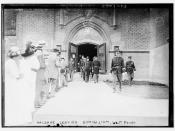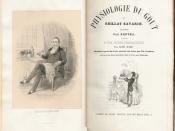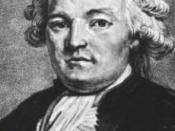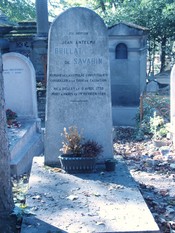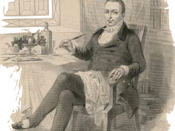While I was pondering over the tactical approach I should adopt to write this report on GoodyÃÂs attempt to incorporate the anthropology of food into his writings, I was met with a pleasant surprise when I received my subscription of TIME magazine in the mail. In bold letters, the cover of the newest issue of TIME (June 25 ÃÂ July 2, 2007) reads, ÃÂWe Are What We EatÃÂ.
Indeed, as Jean Anthelme Brillat-SavarinÃÂs infamous saying goes, ÃÂTell me what you eat and I will tell you who you areÃÂ. Food is a fundamental human necessity, essential to the sustenance of the human body. At the same time, food may be associated with pleasure, passion, even luxury. Food is also essential to the social body. Who eats what, who eats with whom, and whose appetites are satisfied and whose denied, are all profoundly social dynamics through which identities, relationships, and hierarchies are created and reproduced.
As such, it has drawn much attention from the anthropological circle with the anthropology of food becoming a legitimate specialization.
Here, an esteemed anthropologist attempts to look into a comparative study of East and West with a partial focus on what, why, where and how people eat.
British anthropologist and historian Jack Goody (1919 ÃÂ ), Emeritus William Wyse Professor of Social Anthropology at St. James College of the University of Cambridge in the UK, is acknowledged as one of the most versatile intellectuals of contemporary times, especially in his contribution to clarifying the distorted view that the West has of East-West differences. Famous for his fieldwork carried out in Gonja (northern Ghana) and a series of studies in West Africa that resulted from it in the 1950s and early 1960s, Goody used his knowledge of Africa to contrast the culture of that continent with that of Eurasia, an area which, as he explains, developed in a different direction after the rise of cities and writing caused by the Bronze Age ÃÂrevolutionÃÂ. In his more recent publications, Goody has broadened his comparisons to embrace food and flowers, such as in Cooking,Cuisine and Class: A Study in Comparative Sociology (1982), The Culture of Flowers (1993), and, the case in point, Love and Food (1999).
In Food and Love, Goody extends his pursuits into the sphere of culture. Opening with a sustained discussion of the lexicon of such debates in the thought of classic theories such as that of Marxism (MarxÃÂs general scheme of development), as well as contemporary historical and sociological notions of modernization, Goody goes on to survey phenomena as diverse and fascinating as the uniqueness of the European family, the development of romantic love, the evolution of national and regional cuisine's, the globalization of Chinese food, and the histories of various taboos on certain types of food and drink, at all times effortlessly ranging from Europe to Asia and to Africa.
In a final bracing section challenging dominant relativist conceptions, Goody considers the difficulties and complexities of cross-cultural and comparative analysis, and he picks apart the doubts involved in the very process of representation and symbolic communication. Throughout the book, Goody demonstrates that the ethnocentricity of much of Western scholarship has distorted not only the comprehension of the East but also developments in Europe's past and present.
I feel Food and Love is a very holistic book which the only flaw is that it could become an even denser book for there are a few areas Goody touched on that I hope could have been elaborated further. As a student having studied English Literature for through middle school to high school, GoodyÃÂs incorporation of classical works such as PorphyryÃÂs De Abstinentia as examples to his statements was both surprising and delightful. More importantly, Goody covers a rather vast range of topics under the three main categories of family, food and doubt; and he makes use of a wide array of previous works conducted by other researchers to build his cases.
For example, when addressing the concept of ÃÂLove, Lust and LiteracyÃÂ, Goody speaks about the French mentalité school, the LoDagaa people of northern Ghana, China and Japan over the period of times from the Middle Ages to the Reformation and Renaissance to the present. He abstracts information from philosophical theories, literary works, fieldworks he conducted previously, as well as published works by other academics. Also, albeit with an almost subconscious emphasis on historical facts, Goody presents his research in different sectors such as social, cultural and a little on political consideration.
GoodyÃÂs curiosity and encyclopedic range may seem daunting at first, but his eloquence as a writer makes his book an excellent read for all intellectuals as this diversity may be a little confusing for those who are not familiar with any of the examples Goody illustrates. Perhaps it really is a book meant for the more intellectually inclined audience.
Food and Love, unlike his ethnographic writings on culture of flowers, deals with a more serious aspect of life. But in my opinion, one of the most outstanding ideas proposed by Goody, amidst his comparative study of Asia and Europe, is that contrary to what sociologists, anthropologists and historian have assume, the West did not have a special predisposition towards the development of capitalism or modernization. He suggested that instead of talking about the ÃÂuniqueness of the WestÃÂ, we should rather talk about the uniqueness of Eurasia, and especially about AsiaÃÂs considerable contribution. That is, that the idea of stagnant oriental societies, put forward by Marx and so many others, is really but a myth of the West.
Similarly, he undermined the claim to the uniqueness of the West and argued that it distorts our [here referring mostly to people of Western traditions] understanding of the past and present not only of the ÃÂothersÃÂ but also of ourselves. The idea of explaining modernity as the result of so-called Western singularities (like individualism, rationalism and family patterns) has prevented us from having a deep understanding of the East as well as the West. As such, GoodyÃÂs writing is based heftily on comparative studies and he strives to abstain from committing the sin of ethnocentrism and that of leaving any misleading notions.
Remarkably, Goody hardly derails into the trap that many writers fall into while juggling with the comparative approach ÃÂ that is of comparing and contrasting ideas, objects and practices in different cultures but ignores the contest the gives them their meanings.
When reading the book, I felt a constant nagging at the back of my head as I wondered if GoodyÃÂs presentation of a native view is scarce or that it is so profoundly weaved into the context that you could read it without knowing it. That is, while his occasional mention of his fieldnotes in Ghana are a clear indication of this native perspective from an African culture, other times, I feel as though he is trying to incorporate all the data that he has and has slightly neglected this aspect of writing ethnography. Or perhaps ÃÂ and this is a high possibility ÃÂ I am too young and amateurish to realize their presence.
On a more personal note, I found Food and Love a very pleasing read because it showed a convergence between the study of anthropology and the study of history, and produces a very informative yet hardly dry piece of work. As a student still exploring the vast possibilities in a college education, Goody has proven to me that anthropology is indeed an all-encompassing field of study and I think it is this drop of anthropological essence that brought life and color into this otherwise tedious read. In fact, I intend to add GoodyÃÂs The Culture of Flowers (1993) and The Domestication of the Savage Mind (1977) to my reading list.
BibliographyGood, Jack. Food and love: a cultural history of East and West. London; New York: Verso, 1998"We Are What We Eat". TIME. June 2007.
